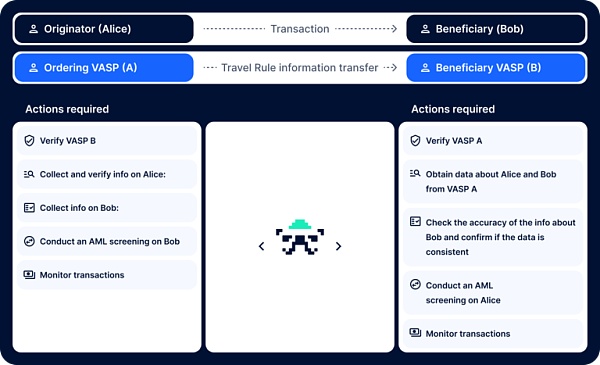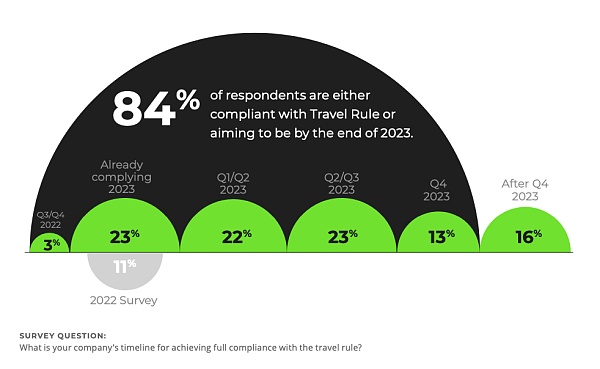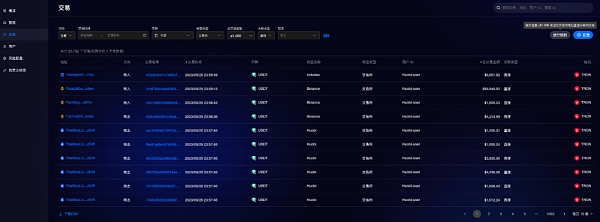In the free Web3 world, can our transactions also travel freely?
Can our transactions travel freely in the Web3 world?Recently, Coinbase announced that starting from September 5th, Singapore users must provide additional counterparty information when depositing or withdrawing virtual assets from their accounts. Coinbase stated that these measures are introduced to comply with the requirements of the Travel Rule in the regulations of the Monetary Authority of Singapore (MAS).
In addition to private entities like Coinbase, crypto-friendly regions and countries such as Hong Kong, Japan, Portugal, and the United Kingdom have also announced the implementation of the Travel Rule this year, requiring virtual assets (VA) and virtual asset service providers (VASPs) to comply with related obligations. So far, more than 30 countries or regions worldwide have legislated the Travel Rule, and more than 10 countries or regions have started to implement related regulatory rules.
1. What is the Travel Rule?
When you go to a bank or make interbank transfers through your mobile phone, you are usually required to provide a lot of information, such as the names and contact numbers of both parties, the recipient’s account, the name and location of the receiving bank, and the transfer method. It may seem complicated, but you should be familiar with it.
However, in virtual asset transactions, you usually only need to provide a wallet address to complete the transfer through an exchange or other channels. This anonymity and convenience in transactions have made virtual assets popular among many users. But can you still accept it if VASPs also require additional real-name information during virtual asset transactions?
- Understanding Cross-Chain DeFi in One Article
- Biographer of Elon Musk reveals heavyweight insider information 10 years ago, he began to worry about AI destroying humanity.
- Story Protocol Self-introduction Devoting a Lifetime to Fixing the Business Model of News and Media
You may not be used to it yet, but as the Travel Rule is widely adopted, these requirements are becoming more common.
In 1996, the Financial Crimes Enforcement Network (FinCEN) in the United States proposed the earliest “Travel Rule” in response to money laundering risks in traditional financial markets, requiring financial institutions in the United States to provide the recipient institution with verifiable information of both parties when the transfer amount exceeds three thousand US dollars.
These rules initially only applied to traditional currency transactions, but in 2019, FinCEN considered the Travel Rule to also apply to VASPs, which are regarded as Money Services Businesses (MSBs) or Money Transmission Businesses in the United States. The Travel Rule began to enter the virtual asset market.
Also in 2019, the Financial Action Task Force (FATF), a global anti-money laundering regulatory organization, proposed regulatory recommendations applicable to any country or region based on FinCEN’s Travel Rule. The FATF Travel Rule requires VASPs engaged in VA transfers to obtain “the required and accurate originator information and required beneficiary information” and share it with the counterparty VASP or financial institution during or before the transaction.

The amount of information to be collected depends on the transfer amount. FATF recommends a minimum threshold of $1,000 USD/EUR for VA transfers.
-
If the transfer amount is below the threshold, VASPs only need to collect the names of both parties, as well as simple information such as the VA wallet address for each transaction.
-
If the transfer amount exceeds the threshold, VASPs must collect more data, including the names of both parties, the account used to process the transaction (such as the wallet address), and the actual geographic location and identity information of the originator.
Because the personal data of the parties involved in these transactions “travels” with the transfer of funds between different institutions, this rule is metaphorically called the “Travel Rule”.
2. In addition to the Travel Rule, you may also need to understand the “Sunrise Problem”.
When we see a wonderful concert, an intense game, or a breathtaking sunrise, we always want to share the joy with our close family or friends in a timely manner. Thanks to technological advancements, we can easily do this even if the other person is on the other side of the Earth.
However, this global connectivity is difficult to achieve in the virtual asset market: because there are significant differences in regulatory environments and attitudes among countries, the virtual asset market is facing increasingly serious “latency” issues. The communication barriers and divergent expectations between compliant and non-compliant institutions, regions, and countries are known as the “Sunrise Problem”.
For example
Let’s take an example. Suppose Country A has already implemented the Travel Rule, while Country B has not. What would happen when VASP institution C, operating in Country A, processes relevant transactions and, according to the Travel Rule, submits a request to VASP institution D, operating in Country B, for customer transaction information?
—— Institution D may not respond to Institution C’s request due to the need to comply with different regulatory rules, and Institution C may lose users or engage in non-compliant behavior as a result.
So how can we solve the Sunrise Problem to better serve global users with virtual assets?
If the virtual asset industry wants to become a truly compliant industry, it must ensure that all relevant parties can understand and participate in regulation synchronously and without friction. This means that the most direct way to solve the Sunrise Problem is to have more VASPs and countries/regions adopt and implement the Travel Rule.
According to Notabene’s annual report on the state of cryptocurrency travel rules, the willingness of the crypto industry to adopt the Travel Rule is growing, and most VASPs aim to achieve full compliance by 2023.

Currently, OKX, Coinbase, Coinone, BitFlyer, and other exchanges have announced their support for the Travel Rule. Among them, OKX announced its integration with Notabene in July this year and will gradually implement measures for the Travel Rule to ensure compliance with global standards.
Furthermore, the market needs more suitable and interoperable technical solutions or solution combinations to meet FATF travel rules and local compliance obligations. The Onchain AML compliance solution launched by OKLink can meet the compliance needs of VAs and VASPs while satisfying the requirements of different regions’ regulations, providing security for virtual asset transactions.
Among them, Onchain AML’s transaction monitoring product KYT currently supports transaction screening that needs to comply with the Travel Rule, helping VASPs better meet regulatory requirements.


We will continue to update Blocking; if you have any questions or suggestions, please contact us!
Was this article helpful?
93 out of 132 found this helpful
Related articles
- Guide to opening an account for a cryptocurrency exchange in Hong Kong How to identify two types of bank accounts
- Berenberg Analyst FASB’s New Regulations Will Benefit Microstrategy Company
- With investment from a16z, how does Story Protocol build IP infrastructure for the Internet era?
- Synthetix Founder Reassessing the Feasibility of Synthetix’s Multi-Chain Vision
- Interpreting Vitalik’s Latest Paper Privacy Pools, Making Compliance No Longer at the Expense of Privacy and Decentralization
- Genesis Global Capital sues DCG and DCGI, demanding repayment of over $600 million in loans.
- MetaMask wallet connects to fiat currency transactions, with total costs of various fees reaching up to 9%.





